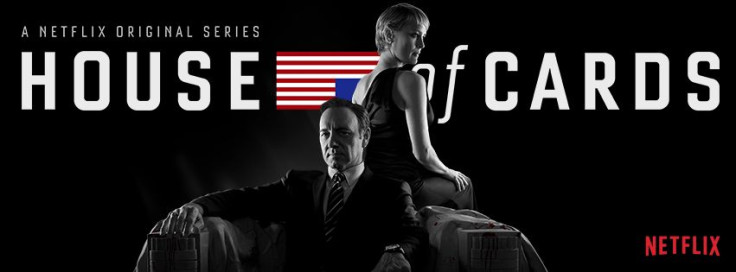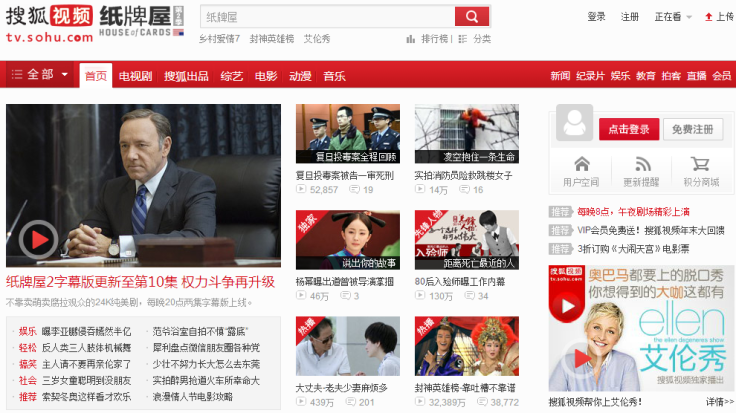'House Of Cards' Season 3 China Audience Top Illegal Download Streams

In China, a country where criticism and even comment on the government are tightly restricted, a fictional television show from America -- that revels in the corruption and manipulation of Washington politicians -- is finding resonance. Netflix released the third season of "House of Cards" this past weekend, sending Chinese fans into a frenzy to download the newest episodes.
According to data by Excipio, a piracy-tracking firm, the highest volume of illegal downloads of “House of Cards” originated in China. According to the firm, within the first 24 hours of the Season 3 release there were 681,889 unique illegal downloads worldwide, with China representing 60,538 of those pirates.
In addition, it is presumed that a sizable portion of Netflix’s projected 20 million China-based users who employ virtual private networks (VPN) to access the subscription-video service are also tuning in.
China is known to have a robust pirated-DVD market for all kinds of Western movies and television shows as a way to skirt licensing issues, the country’s censorship laws and government-imposed foreign-movie quota limitations, but the tens of thousands of mentions of “House of Cards” this past weekend on Weibo, China’s popular microblog service, suggests a higher level of fandom.
The show became a quick success in China last year, when Sohu.com, a video-hosting website that streams several American programs, such as "The Ellen DeGeneres Show” and “The Big Bang Theory,” premiered it with Chinese subtitles after buying the rights for the second season. Just days after that release, “House of Cards” had racked up eight million views on Sohu.com – an impressive feat for an English-language political drama.

The show’s debut in China and its sustained popularity is surprising considering what could easily be perceived as politically controversial content. During the second season, China’s relations with the U.S. became a central subplot, touching on several real-life issues that continue to plague relations between the two countries -- such as accusations of espionage and cyber warfare, currency manipulation and territorial disputes.
Beyond that, the show centers around antihero Frank Underwood (played by Kevin Spacey), a character whose Chinese counterpart would likely fall far short of Communist Party leader Xi Jinping’s idea of an exemplary party member.
Many themes of the show -- sex, drugs, corruption -- are generally taboo for any politician, but particularly those serving in Xi’s China. After two years at the helm, Xi is mostly noted for his wide-reaching anti-corruption campaign. During his tenure, he has weeded out high-ranking officials and local-level government employees on charges of adultery, bribery, corruption and spying – actions that each rank high on Underwood's list of hobbies.
Spacey's character relies on political savvy but also backstabbing, blackmail, manipulation and even murder to further his career. Not only that, but the show suggests that being involved in such illicit activities may get you ahead in life. In Underwood’s case, it can even secure your seat in the Oval Office.
Some in China's government seem to believe that the show damages Washington's credibility by depicting the U.S. political climate as crazed and riddled with corruption, rather than potentially inspiring Beijing's own political figures to follow suit.
“I have seen both seasons of ‘House of Cards,’ which I think embodies some of the characteristics and corruption that is present in American politics,” Cui Tiankai, China’s ambassador to the U.S., said last year in a People’s Daily panel. Cui explained that it also showed the disadvantages of having a two-party system.
“Currently, Americans are arguing and debating on how their two political parties have become so extreme," he said. "Many things can never be accomplished because the interests of each party are of the greatest importance.”
Cui isn’t the only high-ranking Chinese fan of the show. According to Hong Kong’s Phoenix Weekly magazine, "House of Cards" also has caught the attention of Wang Qishan, the strict head of the Communist Party’s anti-corruption body and member of the Politburo Standing Committee.
For now, the show mostly attracts China’s educated elite, meaning those who understand English and the nuances of American politics without the aid of subtitles. But with online pirating services scrambling to provide subtitle translations, "House of Cards" will likely find a wider fan base in China.
On Weibo, fans of the show aren’t as critical of the U.S. government as some Chinese officials may want them to be.
“I can’t believe I finished the whole season, but it was so entertaining I had no self-control!” one user wrote. “Binge-watching ‘House of Cards’ counts as a hobby, right?”
“I’ve never seen such smart and exciting writing and characters! By far my favorite U.S. show!” another added. "It's something that Chinese television just does not have."
Still, government criticism lingers -- in a way that China’s government might not have anticipated.
“This kind of show simply could never happen in China,” a user wrote. “China’s [government] is incapable of separating entertainment from truth from critique. The Chinese version of this show would just end up being a propaganda video.”
© Copyright IBTimes 2025. All rights reserved.






















